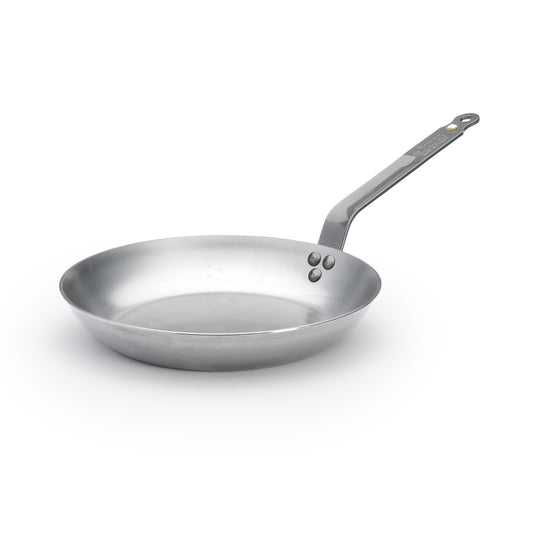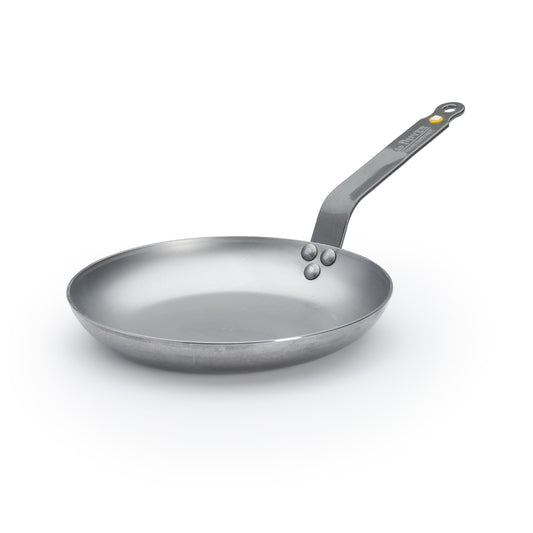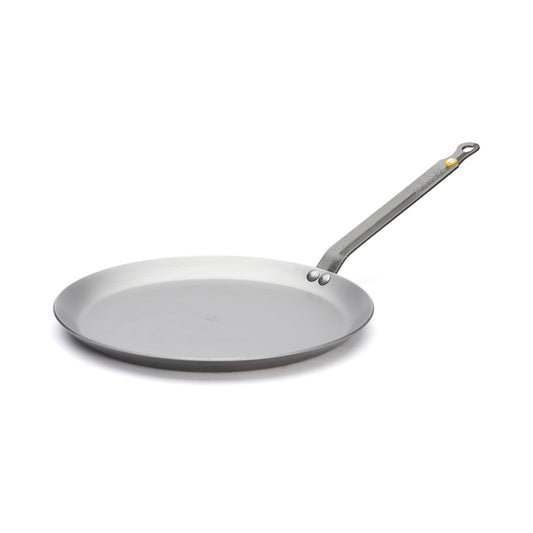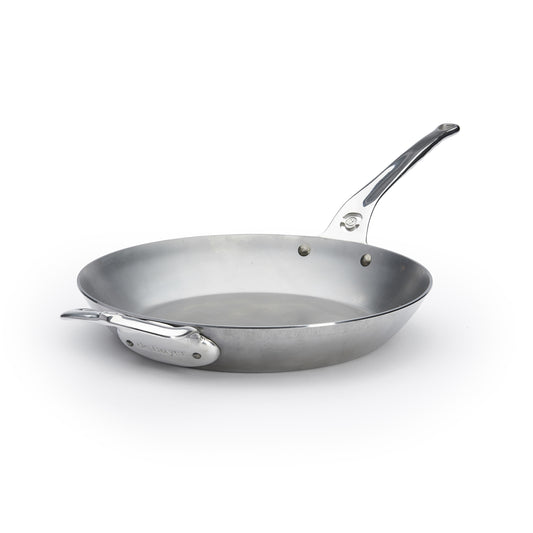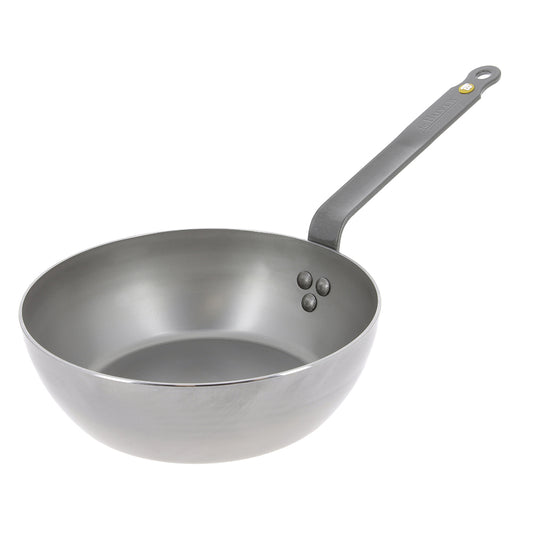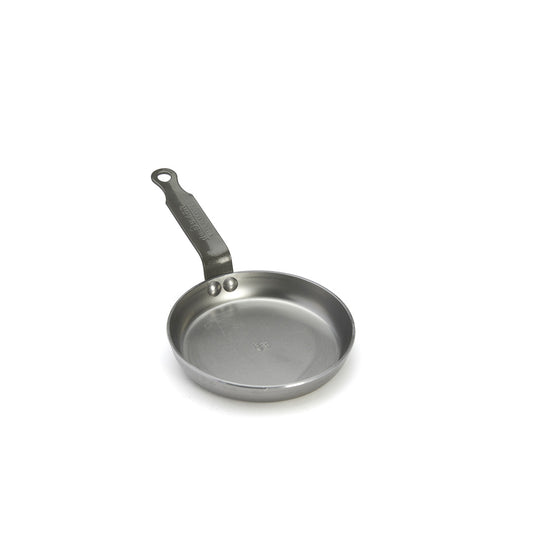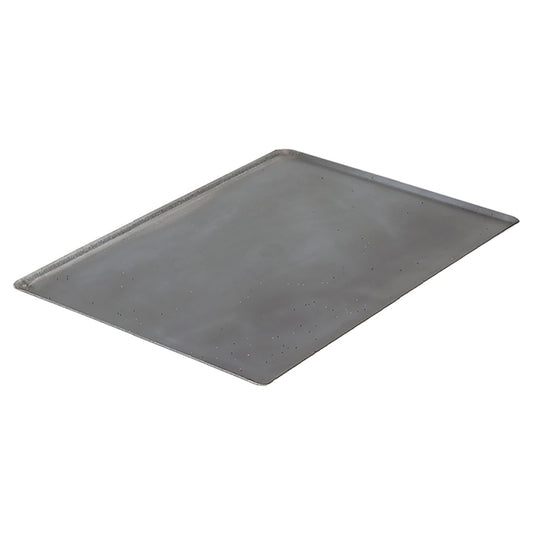Boost Longevity: How to Care for Carbon Steel Pans
Are you wondering how to care for carbon steel pans properly? Unlock expert tips and techniques to keep your pans functioning beautifully for years.
de Buyer

Many aspects of good cooking rely on patience and careful attention. For example, a hearty fall roast will take hours to come together, a well-made bone broth requires months of preparation, and maintaining a fantastic carbon steel pan requires consistent, expert care.
Cared-for carbon steel cookware responds to heat incredibly quickly, offers even heat retention, and is nonstick. With a maintained carbon steel frying pan by your side, home cooks and professional chefs can sear a ribeye with precision and stir fry mouth-watering dishes.
This article will unveil insider tips and practical techniques to empower cooks to preserve the quality and integrity of their carbon steel pans for years to come. Maintenance is a key factor in a carbon steel pan’s performance. We’ll teach you how it’s done.
The Basics of Maintenance
Tough and light, your new carbon steel pan is composed of 99% iron and 1% carbon. This material makes for a seriously robust pan that doesn’t require an artificial coating. However, maintaining these properties means caring for your cookware.
Carbon steel owners clean and season their pan when they first get it and may periodically re-season as needed. This initial seasoning, also called the patina, is a protective coating that acts like paint on metal siding.
It sticks to the metal pan and creates a barrier between the metal and potentially corrosive moisture and oxygen. Enough water and air interacting with metal long enough will create rust build-up. This means that seasoning carbon steel pans is vital for protecting their integrity.
A common myth is that seasoning carbon steel and cast iron pans is necessary to develop a rich taste. While it’s true that a well-seasoned pan can offer a deeper umami flavor, the primary reason for seasoning is to protect your pan and create a naturally nonstick surface.
How to Care for Your Carbon Steel Pans
Shielding Your Pan from Rust and Degradation
A carbon steel owner’s primary job is protecting their pan from rust. Here are the steps every cook should take to prevent rust damage:
- Wash Carefully: Don’t soak your pan for long, as this will allow too much moisture to accumulate. Instead, cool your pan down with warm water and gently scrub the surface of the pan with a small amount of dish soap. Your scrubber should have soft bristles, and you shouldn't use too much force.
- Fully Dry: Water left on carbon steel pans, stainless steel pans, or cast iron cookware can lead to rusting. Ensure all your cookware (including carbon steel) is completely dry after cleaning.
- Store Properly: Stacking carbon steel pans can scratch your cooking surface. Getting a proper season after the metal is scratched is challenging, leading to rust and further damage. Avoid this situation by using a pot rack, pot protection cloths, or other kitchen organization methods.
- Oil When Needed: Some cooks prefer to oil their pans after every cleaning, while others will oil periodically. Regardless, this step will help reinforce the protective barrier. Pour a thin layer of oil (a neutral oil like canola oil or vegetable oil) and rub it all over the pan with a paper towel. Wipe off the excess oil, and you’re good to go!
Tackling Tough Stains and Residue
Cooking is a messy, exciting art form that can leave your kitchenware covered in the stains of past meals. This is normal, even for a naturally nonstick pan like carbon steel. The trick is deciding whether the food stuck to your pan or the unfortunate staining can be removed without removing the protective patina.
The best stain offense is a good defense, so using the above cleaning tips is a solid method of preventing stains. Still, when staining inevitably happens, you can take a small scrubber (no steel wool or anything too abrasive) and use a mild soap and hot water to gently scrub the stain. Rinse, dry, and repeat until the stain or residue disappears.
If the stain persists, you may need to use a method that removes your seasoning. Don’t worry; you can re-season after using any of these techniques.
- Scouring Method: Use a coarser scrubber, such as a scouring pad or steel wool, to scrub rust forcefully in small circular motions until it's gone. Rinse with hot, soapy water afterward.
- Salt Scrub Method: Apply coarse salt and oil to rust spots, then scrub in small circular motions with a soft cloth or paper towel. This method is effective for small to medium-sized rust spots.
- Vinegar Method: Boil equal parts vinegar and water, then pour into the pan and scrub. Rinse with hot water and soap.
None of these methods will damage the pan’s surface, so your carbon steel pan will be ready for the stovetop again after seasoning.
Unlocking the Power of Proper Seasoning
As you know, seasoning a carbon steel pan is just as vital as properly cleaning carbon steel. For your first seasoning, you’ll want to gently scrub the protective beeswax layer off using hot to medium heat water. Then, you may season your pans either in the oven or on the stovetop.
Keep in mind that while both the de Buyer Mineral B PRO and Blue Carbon Steel collections can be oven-seasoned, only the Mineral B can be seasoned on the cooktop only.
Stovetop Seasoning Process
- Oil Your Pan: Use a dry dishcloth or paper towel to apply a thin layer of oil, using only 3-4 drops to avoid excessive oiling.
- Heat on Stovetop: Set the pan over a medium-high heat burner until the oil begins to smoke and the pan turns a dark brown color, indicating the formation of a patina.
- Wipe Off Excess Oil: Allow the pan to cool, then wipe off any remaining oil. Repeat the process 1-2 more times if desired for a darker season.
Oven Seasoning Process
- Oil Your Pan and Heat Oven: Apply a light layer of cooking oil, such as grapeseed or flaxseed oil, and preheat your oven to the oil's high smoke point, usually around 450°F.
- Season in the Oven: Place the pan in the oven for an hour, then allow it to cool before use.
Congratulations! You now have a nonstick pan protected from rust. Occasionally, you may need to strip the seasoning using one of the methods mentioned in the previous section. Continue layering seasonings as needed, repeating the process every few months to develop a protective patina.
Insider Secrets for Pan Perfection
One of the most asked questions about maintaining carbon steel cookware is, "How often should I season?”
Each layer of seasoning will help to protect your pan up to a certain point, but you should avoid overseasoning, as that could lead to a thick, moisture-trapping oil layer. We recommend seasoning every few months to build up the patina that naturally weakens after cooking.
The best way to maintain a perfect pan is to clean it immediately after usage. This gives food and debris less time to stick to the pan's surface. Additionally, avoid cooking with acidic foods since the acid will eat at your seasoning.
Extending the Lifespan of Your Carbon Steel Pans
If properly cared for, your carbon steel pan will last for years. We've gathered some tips for maximizing its impressive lifespan.
- Follow usage instructions: If your pan can’t go in the oven at high heat, don’t use it for high-temp oven-cooked dishes. Following the usage instructions will keep your pan in tip-top shape.
- Avoid the dishwasher: While some carbon steel pans can be washed in the dishwasher, the best way to maintain your cookware is to handwash it.
- Know when your pan is done: Your pan may be durable and offer excellent longevity, but nothing lasts forever. If your pan’s handles are falling off, if you can’t keep rust off, or if it starts heating unevenly, it’s time to retire your pan. The good news is that most carbon steel is recyclable.
Harness the Power of Proper Maintenance with de Buyer
Proper care and maintenance for carbon steel pans will keep your kitchenware performing optimally for ages. Ensure you season correctly, follow the manufacturer’s instructions, and maintain a careful cleaning schedule.
When you’re ready for high-quality, durable carbon steel equipment that delivers exceptional performance, look to de Buyer. Explore de Buyer's selection of premium French carbon steel pans designed for professional chefs and innovative home cooks.
Learn More
Recommended for You
-
MINERAL B PRO Carbon Steel Fry Pan
Regular price $90.00Regular priceUnit price / per$0.00Sale price $90.00 -
MINERAL B Classic Carbon Steel Fry Pan
Regular price $60.00Regular priceUnit price / per -
MINERAL B Carbon Steel Omelette Pan
Regular price $65.00Regular priceUnit price / per -
MINERAL B PRO Carbon Steel Omelette Pan
Regular price $105.00Regular priceUnit price / per -
 Sold out
Sold outProtective Sleeve for Pan Handle
Regular price $9.95Regular priceUnit price / per -
MINERAL B Carbon Steel Crepe & Tortilla Pan
Regular price $70.00Regular priceUnit price / per -
MINERAL B PRO Carbon Steel Fry Pan with Helper Handle
Regular price $145.00Regular priceUnit price / per -
Blue Carbon Steel Fry Pan
Regular price $45.00Regular priceUnit price / per -
Blue Carbon Steel Crepe & Tortilla Pan
Regular price $25.00Regular priceUnit price / per -
MINERAL B Carbon Steel Country Fry Pan
Regular price $100.00Regular priceUnit price / per -
MINERAL B Carbon Steel Egg & Pancake Pan
Regular price $35.00Regular priceUnit price / per -
Blue Carbon Steel Rectangular Baking Sheet
Regular price $35.00Regular priceUnit price / per












